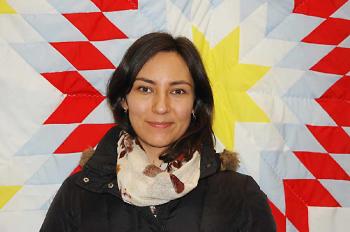Image Caption
Summary
By Shari Narine
Windspeaker Contributor
EDMONTON
Mosum Ernie Cardinal’s impassioned plea that First Nations youth who move to the city must retain their culture and “find a comfort zone for yourself,” hit home with Virginia Dowdell.
“He talked about finding a place that resonates with you, something that feels comfortable for you and heading in that direction. The idea of finding what flows in your life is important and can lead to really fruitful things,” said Dowdell.
Dowdell, who is Métis, grew up in Edson and is now studying communications at MacEwan University in Edmonton. She is also in the process of digging more deeply into her Indigenous roots and tracing her genealogy.
Knowing who you are and where you come from; knowing your language and your culture; finding strength in those aspects of your life; were stressed with both humour and poignancy by mosums Cardinal and Rick Lightning, who spoke at MacEwan’s Indigenous Education Centre on Jan. 23.
“Stay in the city, but keep up who you are. Get your language and learn your traditions. Don’t get amalgamated. Don’t get lost in Canadian society and lose who you really are,” said Lightning. “When you have a weak belief system, you will have problems.”
“Find that comfortable zone of what you really want to do and then find a support, like your parents, your grandparents, like me, like Rick. We’ll help,” said Cardinal.
And while he offered the support now, Cardinal admitted he hasn’t always been able to offer that support. As a former residential school student, he turned to alcohol for a long time. But these “trials and tribulations” can no longer be used as an excuse for poor care of today’s youth, he said.
“We’ve got to take blame for that, for not teaching our children our ways,” said Cardinal, who hasn’t touched liquor for 35 years. “So we have to take that blame. We have to shoulder that. Yes, we ran into trials and tribulations in our past, injustices and that has a big bearing on where we are today. But we can get better.”
Cardinal said Indigenous children are committing suicide “because we didn’t talk to our children…. When you talk to your child, your child gains confidence, starts asking questions, starts learning.”
As someone who works with the parole board, Cardinal is constantly reminded of the loss of culture and traditions and the need to hide that pain in alcohol and drugs.
He also said that most First Nations communities are “dysfunctional.”
Lightning encouraged students to return to their home communities to address that dysfunction.
“What I always tell people, come home when you’re done. Help us change what we have back on the reserve. Make it better,” he said. “We need young people to move back and help us change it.”

